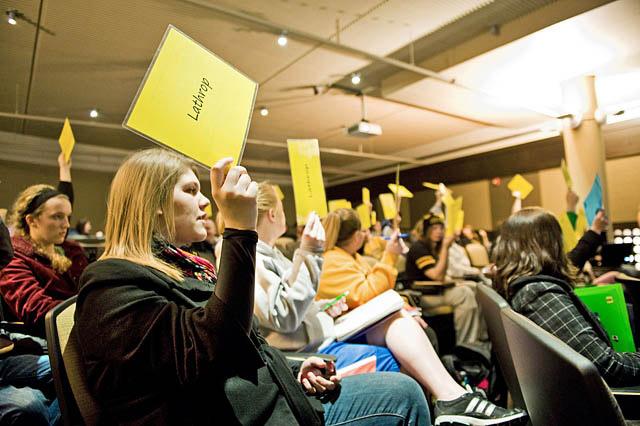If you are a student looking for the full experience here at MU, pick one of its many student organizations and get involved. According to the Organization Resource Group website, MU is home to more than 600 student organizations that cater to all interests.
Although 600 is a large number, there are a few organizations that have established their presence on campus over the years and continue to maintain an adequate amount of members: The Missouri Students Association, Legion of Black Collegians, Residence Halls Association and Greek Life.
MSA:
The Missouri Students Association is MU’s student government. MSA is made up of three branches, five committees and 75 senators. According to the MSA website, MSA is the representative undergraduate student government that serves more than 22,000 students with services and activities from its budget of more than $1 million.
MSA is made up of executive, legislative and judicial branches.
“The Executive branch is the largest, which is composed of our auxiliaries and executive departments which provide various services and programming for students,” MSA President Eric Woods said. “The MSA Senate is the representative body in which Senators debate campus issues and work on projects to improve the Mizzou student experience. The student court deals with issues that may arise within the Bylaws and Constitution of the Association, especially elections cases.”
MSA also brings activities and events to MU students each academic year through the Department of Student Activities, Woods said.
“The Department of Student Activities brings big-name concerts, speakers, comedians, films and other special events and programming to keep students entertained,” he said. “Our auxiliaries such as STRIPES, KCOU, MUTV, the RSVP Center, Craft Studio, etc., provide valuable services to students. Most importantly, as a student government MSA exists to represent student interests to the administration.”
The organization is open to all students and MSA will hold an information session Aug. 24 in Jesse Wrench Auditorium, Woods said.
LBC:
The Legion of Black Collegians is MU’s black student government. According to the LBC website, the organization was established by the men of Alpha Phi Alpha Fraternity, Inc. in 1968 and serves as the black voice on MU.
LBC is made up of an executive board and five standing committees. The executive board is made up of eight positions: president, vice president, political chair, financial chair, communications chair, activities chair, freshman action team chair and secretary. LBC’s five standing committees are the political committee, financial committee, communications committee, activities committee and the freshman action team. The LBC president and vice president for the next academic year are Whitney Williams and Kristen Andrews, and each of the five positions left on the executive board is the head of one of the standing committees.
LBC hosts many events throughout each academic year. In the past, LBC has brought speakers such as CNN correspondent Soledad O’Brien to MU, hosted events such as the annual Black Love Week and participated in the Big XII Conference on Black Student Government every year since 1977.
To get involved with LBC, students can contact the executive board to apply for a position as an LBC senator.
RHA:
The Residence Halls Association gives students a voice in the residence halls. According to a newsletter on the RHA website, “the Residence Halls Association serves as the voice of the residents, in essence giving power and direction to students who seek our help and advice.”
The newsletter also states that any student living in an MU residence hall has complete access to the executive and the legislative branches of RHA. Chris Rucker serves as the RHA president and Caleb Krenning serves as the RHA vice president.
“RHA stands for the Residence Halls Association, and ideally we’re just that: a collaboration of each of the residence halls across campus that represents the special interests and needs of the students who call Mizzou home, not just school,” Rucker said.
According to the RHA constitution, the purpose of this organization is to ultimately be the student voice in the residence halls and to provide communication between the residents, the Department of Residential Life and university administration as well as other organizations.
RHA has worked on issues such as installing cameras outside residence halls to increase safety on campus and, most recently, gaining support for gender neutral housing in the residence halls.
Greek Life:
If you are a student looking for a large organization that is based on brotherhood, sisterhood, philanthropy and networking, consider Greek Life. More than 5,100 students, or about 22 percent of MU’s student population, participate in Greek Life and about 2,000 students new to Greek Life get involved with the organization and recruitment process every year, Greek Life Coordinator Julie Drury said.
MU’s Greek system is made of 52 chapters and four councils to govern: Interfraternity Council, Panhellenic Association, National Pan-Hellenic Council and the Multicultural Greek Council.
According to the MU Greek Life website, “The 52 organizations within the Greek community provide a support system that makes the campus community seem much smaller.”
The website also states that the Greek community offers students a balance of leadership, academics, philanthropy and social opportunities to further and boost the experience a student has during his or her years at MU.
These organizations are just a taste of the groups MU students can get involved with. A full list of all MU organizations can be found through the [ORG website](http://getinvolved.missouri.edu/). If you find that MU does not have an organization that caters to your interests, gather up a few like-minded students and start your own organization through ORG to improve your overall experience at MU.








